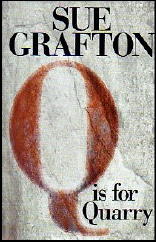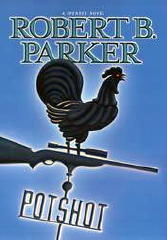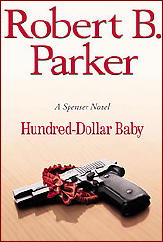Tue 30 Dec 2008
Reviewed by Walter Albert: Q Is for Quarry (Grafton) and Potshot (Parker).
Posted by Steve under Authors , ReviewsNo Comments
SUE GRAFTON – Q Is for Quarry. G.P. Putnam’s Sons, hardcover, 2002. Reprint paperback: Berkley, 2003.
ROBERT B. PARKER – Potshot. Putnam, 2001. Reprint paperback: Berkley, 2002.
In recent novels, Kinsey Millhone has been rediscovering her family and she’s not at all happy about it. The main plot line in Q Is for Quarry concerns an eighteen-year-old cold case that two aging cops (Lt. Con Dolan and retired detective Stacey Oliphant) are attempting to solve.

Oliphant’s non-Hodgkin’s lymphona has reappeared after ten years in remission, and Dolan is an incessant smoker who’s had a series of heart attacks that have put him on medical disability. As a young cop Dolan was called to the scene of the discovery of the body of a young woman, while Oliphant was one of the original investigating officers.
The woman was never identified. Dolan asks Kinsey to help out and, with both men intermittently sidelined because of their health problems, it’s her usual careful, methodical legwork that eventually closes the case.
In Potshot, Spenser is hired by a woman to find out who murdered her husband, and he heads off to to Potshot, Arizona, where she and her husband run a “little tourist service.”
He finds the town is largely controlled by a community of outcasts and misfits who have been molded by their leader, the messianic Preacher, into a formidable and deadly force. Spenser, hired by the town’s leaders to clean out the “Dell” where the Preacher and his cohorts hole up, brings in his own force for assistance.

However, he begins to suspect that nothing is exactly as it appears to be, a realization that doesn’t detour the clean-up but makes it something less than the top priority for Spenser, which is to find out the truth.
The two writers, apart from their common ability to tell a good story, approach that task quite differently. Parker is the terse, concise stylist, who gives the impression of not having an unnecessary ounce of padding in his narratives.
This sometimes leads to a concision that sets my teeth on edge, but only momentarily. (There’s a very awkward moment with Susan when Spenser fractures the French language in a bit of inelegant linguistic playfulness, and I rather liked it that his uptight lady friend was, as ever, correct, and Spenser was rather bluntly incorrect.)
Grafton is digressive and expansive, probably more so than in her earliest work, but the solid, hard-nosed investigations she undertakes still draw me in, even as I wish that she would let Kinsey deal more directly with her ambivalent feelings about her family and either move on past them or find some measure of reconciliation with them.
The two novels, by writers of long-running series and still apparently professionally comfortable with what they’re doing, should satisfy their many fans among whom I still count myself.

[COMMENT] This and the next batch of reviews from me, some of them going back quite a way, are of books by writers I’ve been following over the years. I’m increasingly tired of writing about series in which the quality doesn’t vary significantly from one title to the next. I’ll use this as a way of signing off on some of them.
Four years after I wrote the reviews of these two books, I read Parker’s Hundred-Dollar Baby (Putnam, 2006; Berkley, 2007). Spenser takes on a case for April Kyle, whom he once helped off the streets and into a “safer” line of employment.
Good works don’t always turn out well in the end. Another smart, smooth performance by Parker. And unless Parker falls from his pedestal, pulled down by a dumb, clumsy performance, that’s my final word on the Spenser series.